Nine Ghanaian instructors learn key trades in Edmonton
For much of 2022, a group of men and women from Ghana have been getting a crash course in key energy-industry trades thanks to NAIT and a group of international partners – in hope of helping to bolster an entire industry back home.
The group arrived in Edmonton in late January, and they aren’t your typical students, either. All nine of them are instructors at technical universities and colleges across the West-African nation of 31 million people. But they put their lives back home on hold to study trades that power one of the world’s largest oil-and-gas sectors, so that they might return to put the knowledge they’ve gained toward kickstarting that same up-and-coming industry in Ghana.
The instructors came to Canada – trading the summer warmth of their equatorial tropical climate for the dry cold of a Prairie winter – because they understand the potential a project like this has for the future of tradespeople in Ghana, not to mention Ghana itself. They want to increase prosperity for their fellow citizens and workers.
“We are really passionate about this,” says Gladys Perpetual Awudi (below), who teaches welding at Koforidua Technical University. This October, her time as a student will come to an end as she and her colleagues complete their program at NAIT and prepare to pass on what they’ve learned.
An international collaboration
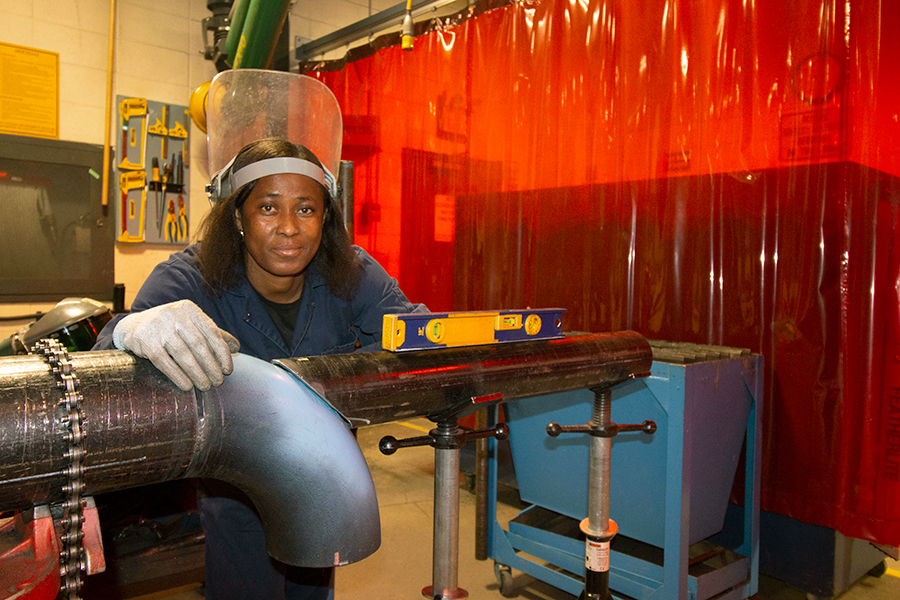
The students’ intensive nine-month program is the result of an international collaboration that began when Ghana’s federal Petroleum Commission reached out to CPI Training, a Canadian-owned project-management firm that specializes in technical vocational trades – and which happens to have an office in Ghana’s capital of Accra.
CPI has a longstanding relationship with NAIT’s Corporate Training and Continuing Education departments, and offered to fly members of the commission to NAIT’s Edmonton campus to see the facilities for themselves.
The commission members were so impressed they decided to sponsor a group of nine instructors to make the trip to attend NAIT. CPI handled logistics, including flights, housing and insurance, while NAIT was responsible for delivering the education.
Mustapha Hameed, manager of the Petroleum Commission’s Accelerated Oil and Gas Capacity Program, describes the project as taking a two-pronged approach.
“First we are sending our instructors so they can train as master instructors in the areas of pipefitting, welding and mechanical maintenance,” he says. “Then, when they come back, we hope that they will be able to develop local curriculum that is in line with what you have in Alberta. They then will be the vanguards of the program and begin to train others locally.”
This is actually the second time CPI and the Petroleum Commission have worked together – the first trip was a simpler training program in 2019 at NAIT for five Ghanaian welders.
“These countries need the skilled work force, and they don’t have it,” says Terry Drabiuk, president of CPI. “So the demand is extremely high.”
Instructors like Awudi have seen this demand first-hand. When oil companies announce they are ready to begin drilling in Ghana, she says, “The government says, ‘Employ my people.’ But the companies will say, ‘Your people are not qualified for what we want to do.” Instead, those jobs are given to visiting foreign workers – for now.
What Canada has to offer
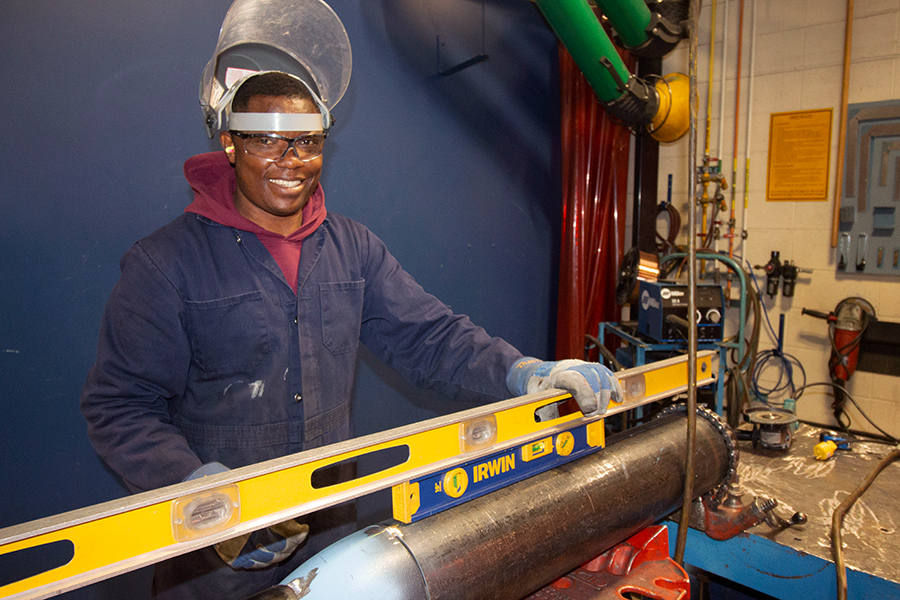
Even with a nine-month stay in Edmonton, the group from Ghana has kept a highly condensed schedule learning the basics of three different trades: welding, millwright and pipefitting. On top of that, the students have taken courses on how to become better instructors.
It’s a lot of information, but the Ghanaian students have been eager to take it all in. They’ve kept an eye on areas of specific improvements they want to make back home.
“For me, number one is standards,” says Frank Nana Osei (above), who teaches at Takoradi Technical University in the joint city of Sekondi-Takoradi. “Ghana is a British-colonized country, so most of the time we rely on British standard codes. But there are other codes out there.”
Osei believes that studying Canada’s industry standards can give Ghana another example they can learn from in the hopes of one day developing their own.
“I think this is the beginning,” he says.
Another area of interest is certification. Ghana is a member of OPEC, and has seen its oil production spike in recent years, with an average of 176,000 barrels per day as of September 2021. (By comparison, Alberta produced a record-high 3.6 million barrels per day between January and June of this year.)
Yet the jobs running these wells tend to be given to foreigners, for the simple reason that they possess internationally recognized certification for their skills, whereas local graduates do not.
“In Canada, you can’t weld if you don’t have a journeyman ticket. But in Ghana, we don’t have that,” says Awudi. “We have very good welders, automobile workers, electricians. We have very good workers. But we don’t have that ticket.”
Machinery, up close and personal
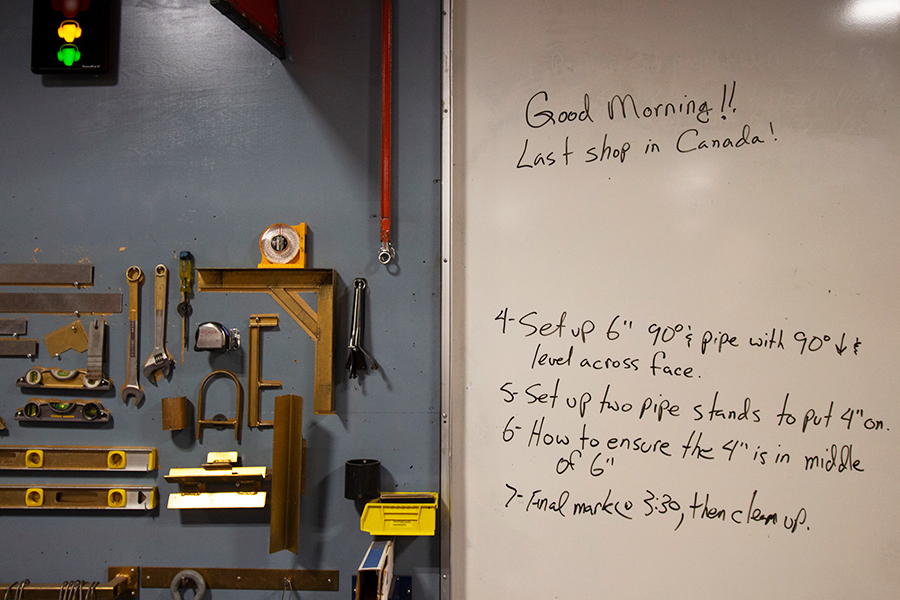
Students in Ghana receive similar theoretical information, but they don’t have access to the size and scope of NAIT’s facilities, or the ability to practise on real-life machinery in such a hands-on way.
“Here, the facilities available are such that it promotes teaching and learning,” says Osei. “So one of the things I am going to speak about [back home] is the practical aspect.”
Indeed, one of the long-term goals of the Ghanaian government is to build a national centre of excellence similar to NAIT, where students learning trades can train and receive international certification for their work.
“NAIT is a very professional body,” says Hameed. “They know what they are about. Their level of expertise, their equipment, their skill – it’s something you can compare with anywhere in the world. We’re happy we have a partnership with them.
Snow and spices
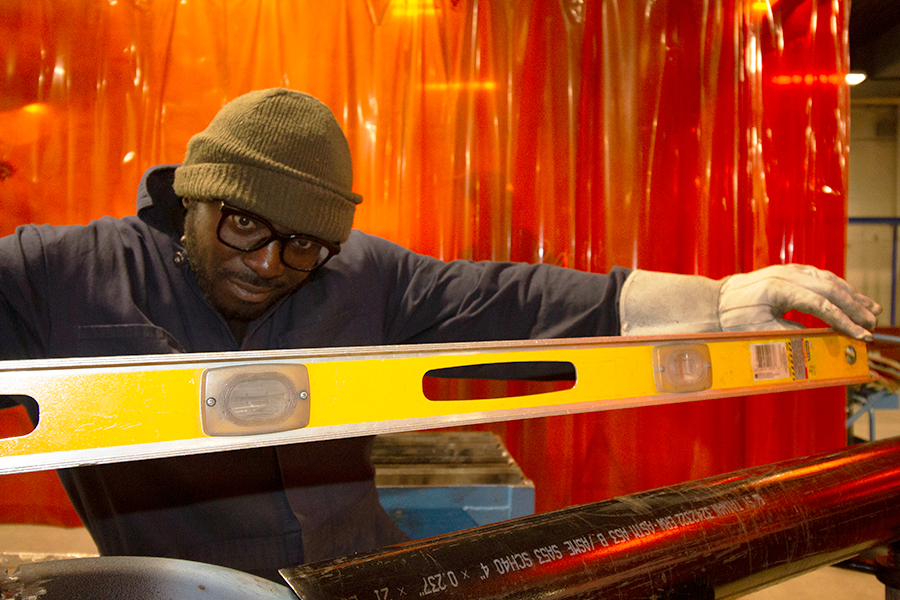
For the students, such a long trip came with its fair share of adjustment to their new temporary home. Arriving in late January, for instance, meant that they have experienced both the frigid lows and sweltering highs of Alberta’s climate.
“The weather in Canada …” says Osei, shaking his head. “You can’t predict what you will have in the next five to 10 minutes. In Ghana, we have only two seasons: the rainy season and the dry season.”
But there were other things the students struggled to adapt to – especially when it came to food.
“Sometimes you go to eat something [here] and people say it’s spicy,” says Daniel Kyei-Kankam (above), an auto-mechanical instructor at Takoradi Technical University. “But the spice turns out to be just honey and sugar!”
Eventually, however, the students were able to track down flavours that tasted like home. The discovery of Selasi’s Grill, a restaurant specializing in West-African cuisine not far from NAIT Main Campus, was a moment of celebration and has become a staple for ordering in.
The group’s welding instructor, Marcelo Mena, also noticed his students complaining about how unnecessarily sweet Canadian food was. So on the last day of class, to celebrate the entire group passing their Canadian Welding Bureau test, Mena invited them all over to his house for a barbeque.
“And, of course, I made my chicken a little spicier,” says Mena, who is from Chile. His recipe was full of oregano, basil, cumin – and no added sugar. “They loved it.”
Hopes for the future
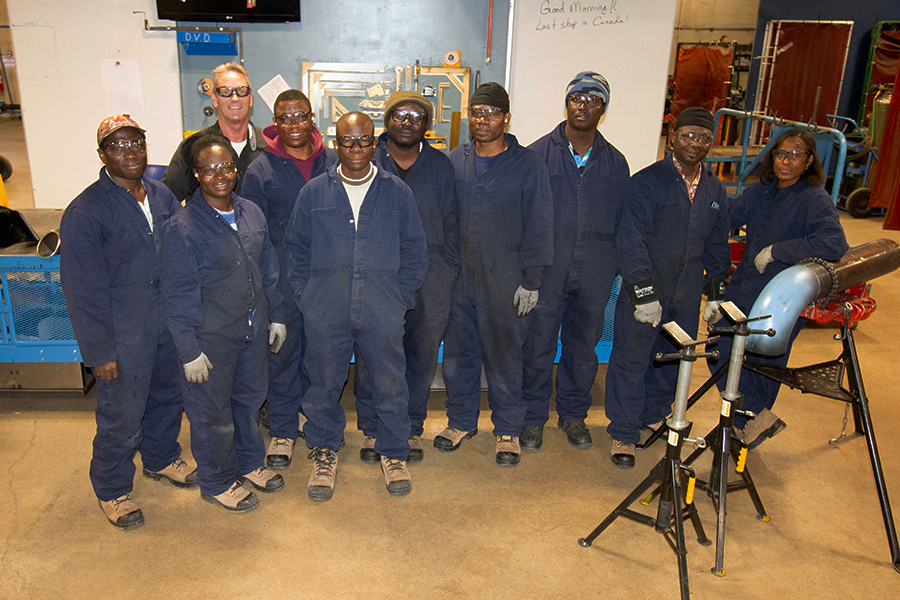
With their time at NAIT soon coming to a close, the Ghanaian instructors are excited to get back home and start putting their newfound knowledge and ideas to work.
They’re also motivated because they know they aren’t alone in wanting to improve the local industry.
“We did not come here on our own, as individuals,” says Osei. “We were brought here by our government. With the Petroleum Commission spearheading this, we are hopeful they will carry out our ideas.”
“Our government has done very well for us, and it is very much appreciated,” agrees Awudi. “Sending one person costs a lot of money. So to bring all nine of us, and house us, it tells you how passionate they are about this program.”
At the same time, the instructors know better than anyone that there is still a long and complicated road ahead of them, and that knowledge is only the first step in a process that will take years to see results.
“We hope this will make a great impact, but everyone must come onboard,” says Awudi. “The government must be willing to provide resources. Industry must be willing to meet the government. We are training people for the industries, and if we are able to train those skilled workers, then the industries will be boosted again.”
“So we pray,” says Kyei-Kankam with a laugh. “And we hope.”
International training at NAIT
For more than 40 years, NAIT has designed and delivered training solutions ranging from work force development to complete institutional building projects for clients in more than 50 countries.
Recent projects include developing training capacity for the energy industry in Cuba, improving safety and productivity for the Weyerhaeuser in the U.S.A, and apprenticeship training for workers at a Mexican gold mine.
“We offer learners the opportunity to transform their industries efficiently and sustainably,” says Jenna Ramirez, portfolio manager for International Training & Foundational Learning.
This taps into a current trend in international education toward investing in technical and vocational training, she adds, and focuses on partnering with governments and corporate clients to supplement or advance learning and even to develop education and training centres modelled on NAIT itself.
“As such we make meaningful impact with each project we complete,” says Ramirez.
– NAIT Staff